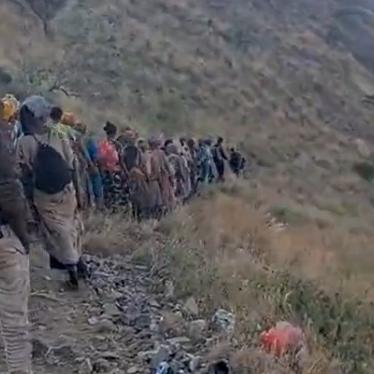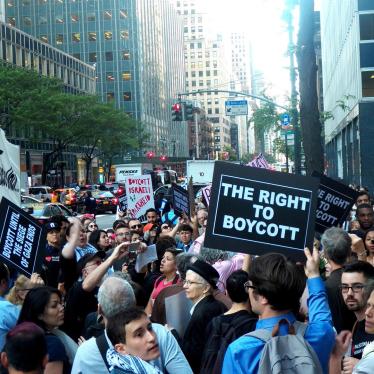We are writing to protest the threat by the Egyptian Ministry of Health to close down the El Nadim Center for the Psychological Rehabilitation of Victims of Violence, a highly respected organization working in the fields of medicine and human rights-- and the only organization in Egypt to provide treatment and rehabilitative services to survivors of torture. In the past, Human Rights Watch has repeatedly expressed to Egypt’s government its grave concern over the crisis of torture in your country, as well as over restrictions on the fundamental freedoms of expression, association, and assembly.
We are writing to protest the threat by the Egyptian Ministry of Health to close down the El Nadim Center for the Psychological Rehabilitation of Victims of Violence, a highly respected organization working in the fields of medicine and human rights-- and the only organization in Egypt to provide treatment and rehabilitative services to survivors of torture. In the past, Human Rights Watch has repeatedly expressed to Egypt’s government its grave concern over the crisis of torture in your country, as well as over restrictions on the fundamental freedoms of expression, association, and assembly. We are therefore doubly disturbed and alarmed at this action. It demonstrates a willful disregard for the essential rights of citizens to speak out and to organize. It also displays an ominous animosity toward the courageous work of Egyptians who are struggling to expose the crime of torture, assist its victims, and bring its perpetrators to justice. We urge you immediately to cease the harassment of the El Nadim Center, and of other organizations and activists working to combat torture in Egypt.
On the evening of Sunday, July 11, three representatives of the Medical Licensing Department in the Health Affairs Office of the Governorate of Cairo—an arm of the Ministry of Health--came to the El Nadim Center for the Psychological Rehabilitation of Victims of Violence. Although they stated their purpose was to inspect the El Nadim Center’s medical clinic, they instead searched the Center’s files and library, opening drawers and bookcases, and confiscating patient files and El Nadim Center publications. One of the three took photographs of the Center and of its computers and documents. The representatives were reportedly aggressive and threatening. Human Rights Watch has received reports that the representatives have filed a statement accusing the El Nadim Center of violating provisions of the Law on Medical Establishments, which place restrictions on the activities of clinics. We understand that, as a result, the Ministry of Health is threatening the closure of the El Nadim Center.
The El Nadim Center was founded in 1993 by a collective of doctors and psychiatrists. The Center has gained international recognition for its pathbreaking work treating men, women, and children tortured by Egyptian police and security forces, as well as refugee torture victims and female victims of all forms of violence. Its work has made it an invaluable repository of testimonies and medical documentation on the forms and impact—as well as the practitioners—of torture. When the victims it serves are willing, it has helped them to publicize the indignities they have undergone, to seek redress, and to pursue civil remedies and criminal charges against their torturers. Such advocacy is hardly inconsistent with its clinical services: accomplishing justice is part of achieving healing, and anyone supporting victims of torture should be deeply concerned to punish and prevent the crimes against them. The many organizations in Egypt and worldwide which have cooperated with the El Nadim Center and learned from it will be equally disturbed by the threat to its services.
Human Rights Watch has voiced concern in the past over the legal restrictions Egypt continues to place on the activities of non-governmental organizations (NGOs). Law 84/2002 was passed by the People’s Assembly on June 3, 2002 over the objections of many organizations, which called attention to the unreasonable powers the law accorded the state. It required existing organizations to reapply for registration with the Ministry of Social Affairs within one year of the law’s passage in order to operate legally. This process has been fraught with arbitrary decisions by the Ministry which clearly show the purpose of the law as to curtail rather than enable civil society in Egypt.
The law, as well as the executive statute for its implementation, contains sweeping and vaguely-worded provisions which tighten state control over NGOs and severely compromise the right to freedom of association. The law bars groups that the state determines to engage in “party activity”or to be “threatening national unity [or] violating public order or morals” (Article 11). It also allows the Ministry to supervise the activities and approve and disapprove the funding of registered NGOs, to shut down organizations without any judicial order, and to confiscate their property.
The law provides criminal penalties for unauthorized NGO activities (Article 76). Persons who form “clandestine organizations” can be punished with one year’s imprisonment and a substantial fine—in effect criminalizing many forms of informal or grassroots organizing. Persons carrying out the activities of an NGO prior to its formal registration are liable to a three-month prison term.
A number of NGOs have already been arbitrarily denied legal status by the Ministry of Social Affairs. In June 2003, the New Woman Research Center, a respected group raising public awareness of women’s rights issues, was rejected by the Ministry, in a letter stating that “security agencies do not approve the registration of the aforementioned foundation.” Later that month, the Land Center for Human Rights, working on economic and social rights issues in rural areas, was denied its application to register as a new entity, Awlad al-Ard (Sons of the Earth); the Ministry’s letter also cited security concerns.
In September 2003, the Ministry rejected the application of a new group, the Egyptian Association Against Torture. In a letter, it specifically objected to the organization’s goal to “work to change Egyptian legislation in accordance with human rights conventions, in particular the [United Nations] Convention against Torture:” the Ministry stated that civil associations cannot be “concerned with legislation, passing laws, and changing them.” In March 2004, the Egyptian Initiative for Personal Rights, a group defending privacy rights, was denied registration in a letter from the Ministry, which cited Article 11 of Law 84/2002 without further elaboration.
In Egypt as elsewhere, the state has an interest in regulating civil society—not in order to restrict its work, but to enable citizens fully to exercise their political rights, including political advocacy. By contrast, Egypt has put in place a regimen of restrictions on NGOs that renders their existence tenuous at best, and puts basic freedoms at risk. The present threat to the El Nadim Center is part of a pattern. We are particularly concerned that your government, not content to operate through the powers of Law 84/2002, has now enlisted the Ministry of Health to harass and hamper civil society. As if it were not enough to circumscribe and impede the work of organizations striving to publicize and punish incidents of torture, your government is now attempting to prevent provision of services to torture victims, and to deny them medical and rehabilitative care.
In a letter dated May 16, 2004, and addressed to 44 members of the U. S. Congress who had written you in concern about the prevalence of torture in Egypt, you referred to “the longstanding policy of the Egyptian government to take swift corrective actions” against the crime of torture,” as well as to “our firm commitment to ensure, without discrimination, the highest standards of human rights.” The harassment of the El Nadim Center unfortunately belies these claims. Torture and impunity for torture are endemic in the Egyptian criminal justice system, as Human Rights Watch has documented. It affects a range of victims, from political and religious dissidents to men suspected of having sex with men. A real commitment to ending it, and to respecting human rights without discrimination, entails an explicit commitment to protect the work of those civil society agents exposing state abuse and advocating against injustices. Your government instead shows itself prepared to protect the abusers by silencing civil society. The international community will not fail to understand this message.
We urge you to:
• Immediately end the harassment of the El Nadim Center; allow it to continue its activities as a clinic, including its advocacy on behalf of victims of torture; and ensure the legal recognition of other civil-society organizations defending human rights and opposing the crime of torture.
• Require the Medical Licensing Department to return any patient files and other materials confiscated from the clinic’s office, and to cease and desist in their politically motivated investigation of the clinic.
We also urge you to:
• Work for the repeal of all provisions in Law 84/2002 that allow the Ministry of Social Affairs to deny legal status to NGOs because of their political advocacy or positions, or other vaguely-worded considerations including “public morals” or “public order”—as well as provisions that give the Ministry power to supervise and decide about registered NGOs’ activities, funding, and continuing existence.
• Work to repeal other legislation used to restrict political freedoms in Egypt, including Law No. 162 of 1958 (the “Emergency Law”), and to bring to an end the state of emergency used to justify political repression.
Thank you for your immediate attention. We look forward to your reply.
Sincerely,
Kenneth Roth
Executive Director
Sarah Leah Whitson
Director, Middle East and North Africa Division







